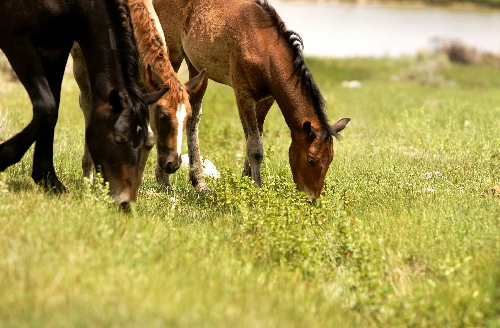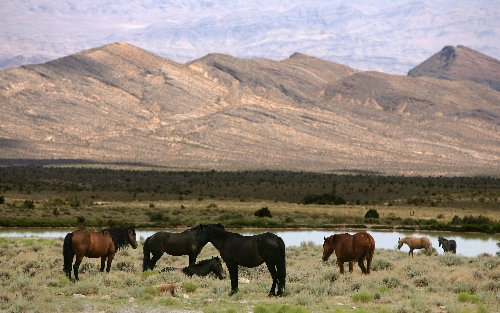Abuse of wild horses targeted
RENO -- The head of the U.S. Bureau of Land Management in Nevada is appealing to agency employees to step up and blow the whistle on any abuse of wild horses.
That is the best way to stop horse advocates from undermining the agency's roundup policies with video footage of the mistreatment of the animals and making it harder for federal land managers to win the public's trust, Amy Lueders said.
"Regardless of title, whether you are a contractor or law enforcement or public affairs, that's everyone's responsibility," she said.
In the past year, BLM has been taken to task by its own internal auditors, independent reviews, a U.S. district judge and camera-toting horse advocates.
A BLM task force that reviewed a roundup near the Nevada-Utah line in July found some horses were whipped in the face, kicked in the head, dragged by a rope around the neck and repeatedly shocked with electrical prods.
Twice this year, BLM has issued reports or statements pledging reforms to ensure humane treatment only to have videos of new incidents of mistreatment surface within days.
In the most recent case, Ginger Kathrens was pointing her camera at the wranglers this month who repeatedly shocked several burros with a prod.
The practice, called "hot-shotting," is used to help move animals into a pen or trailer and happened the same day BLM chief Bob Abbey issued a report pledging more changes.
The report said that electrical prods should be used only as a last resort when human or animal safety is in jeopardy and that they should never be used on a horse's head or genitals.
"I thought it was ironic that while Bob Abbey was announcing the reforms, I was filming the hot-shotting of the burros," said Kathrens, an Emmy-award winning filmmaker who is the executive director of the Colorado-based Cloud Foundation, a nonprofit horse advocacy group.
Kathrens said she was about the length of two football fields away when, zooming in with her professional lenses, when she captured the footage.
The video showed the end points on the prods producing a shock when a wrangler lifted it into the air.
Most disturbing to Kathrens was that officials for the U.S. Agriculture Department and BLM were standing near the wranglers and witnessed the shocks but did nothing.
Kathrens said BLM officials told her privately that they shared her concerns in that regard.
That is where Lueders said agency workers have to do a better job.
Lueders delivered that message to several dozen employees in a video teleconference involving all of Nevada's BLM offices last week, saying there is no excuse for turning the other way if they get wind of any inhumane treatment of animals.
Lueders said, however, that it might be easier said than done to persuade workers to step in to act in what often is considered controversial and emotionally charged situations.
But she said she thinks her message got through.
"I made it very clear that is my expectation," she said. "We have a lot of committed, passionate people here who care very much about the resource and the animals themselves. You can tell by that passion and professionalism that everyone takes it very seriously."
Lisa Ross, a public affairs specialist for the BLM in Winnemucca, said Lueders' words have been well-received and will be taken seriously.
"It's a very important message to hear," Ross said. "It doesn't mean that everything was wrong, and now we are making it right. It's just that it is important, and everybody needs to be on the same page on this."
About 33,000 wild horses freely roam 10 Western states, about half in Nevada. An additional 41,000 are kept in government-funded facilities, including one in Herriman, Utah, that came under fire because of video footage taken by horse protection advocates in the spring.
A BLM task force asked to investigate issued a report in September confirming "unacceptable" conditions at the overcrowded facility where horses were forced to stand in a 4- to 8-inch deep mixture of mud and manure. BLM has moved those animals elsewhere.
It was videotape of a helicopter either nudging or getting extremely close to a horse in August during a roundup in northeast Nevada near the Utah line that prompted U.S. District Judge Howard McKibben to give BLM a lecture.
McKibben granted a temporary restraining order requiring helicopters to keep their distance from the galloping horses.
Lueders said it is important to remain open to criticism.
"I think we all learn more from each gather," she said. "Each gather gives us another opportunity to improve what we do."
Kathrens is among those who believe BLM officials are sincere and is optimistic reform might soon follow on the range.
But Anne Novak, executive director of Protect Mustangs, based in Berkeley, Calif., isn't so sure. She said there should be a moratorium on roundups until the agency proves they have mechanisms in place to guarantee safe and humane treatment of the horses.
"The BLM must take responsibility to train their contractors before turning wranglers loose with whips and cattle prods," she said.


















